Songs of the Voiceless
Don Lee’s affecting new novel
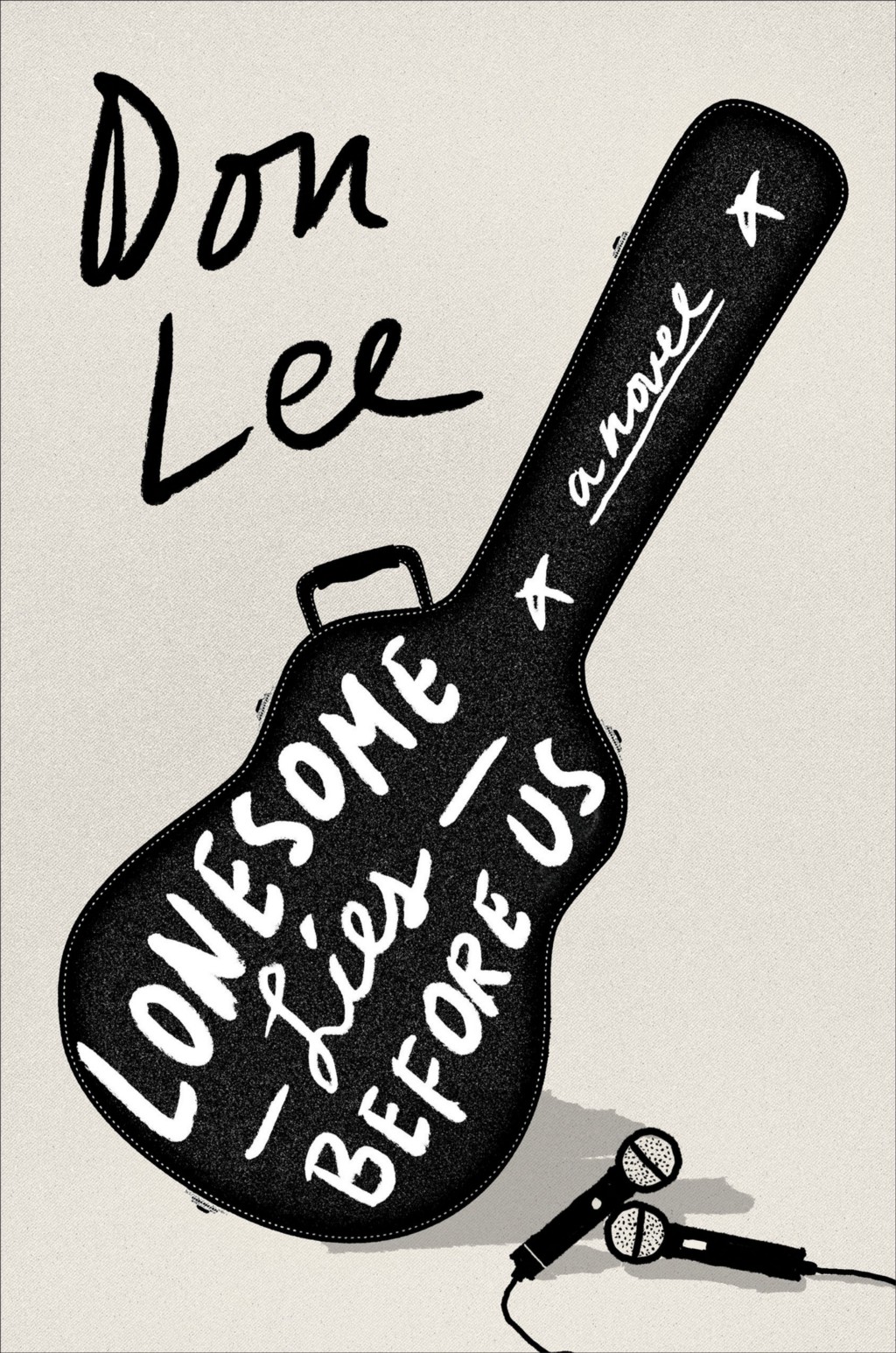
The characters in Don Lee’s new novel Lonesome Lies Before Us are reduced. They have health issues, financial issues, and legal issues. They live in dying towns and work in dying industries. They have destructive compulsions and addictions; people and institutions have let them down. Luckily, the drama and pathos lie not in how they’re reduced, but in how they deal with it — or, more frequently, how they don’t.
A past winner of an American Book Award and an Edgar for his 2004 debut novel Country of Origin, Lee’s previous fiction took questions of Asian-American identity head-on. Lonesome Lies Before Us is his third book set in the Northern California town of Rosarita Bay, a fictionalized Half Moon Bay, where jobs are scarce and locals are beholden to the fruits of fickle tourism. It’s here that Yadin Park, a mostly forgotten songwriter in his mid-forties, has settled as a carpet installer, still writing songs during idle hours and halfheartedly (though not for lack of trying) dating his boss’s daughter, Jeanette.
Novelists have long been enamored by songwriters, and not only because of the likenesses between the two crafts. Where painters, sculptors, and even athletes are ascetics for their art — adherents of intense training, laborious development, and hard-won expertise — songwriters are defined by moments of enlightened inspiration rather than slow mastery of method. They are impulsive romantics, the greatest of whom both inform and reflect the mass mind.
Save for his being a brilliant alt-country composer (can anything be respectably alt-anything, anymore?), Yadin was never a fit for the scene. Despite a small and committed fanbase, he refused to make commercial concessions and never grew comfortable performing, dulling his stage fright with booze and drugs while working his way deeper into debt each year. If that weren’t enough, his recording career was cut short by Meniere’s disease, which has gradually robbed him of his hearing. To limit the damage, he seeks to eke out a quiet existence in Rosarita Bay, minimizing the risks of his former lifestyle by any means possible — strict dieting, steady day labor, and a stable if passionless love life.
Jeanette, too, is self-conscious and unfulfilled, cleaning rooms in Rosarita Bay’s one resort by day, passing long nights with Yadin in a rented bungalow, and tending to her aging father on weekends. Once an idealistic hippie and aspiring photographer, she’s grown cold and disillusioned in middle age, laid off from a job at city hall obviated by automation. Although an avowed atheist, her sole release comes via her involvement in the local Unitarian Universalist church, the existence of which, like most everything else, is threatened by budget cuts.
The Unitarian church as captured by Lee is a fascinating, frustrating outlet for its small congregation of conflicted, compromised attendants. Steeped in Bay Area leftism but riven by the local economy, they join services for fraternity and polite life coaching which more often than not stops short of substantive guidance or authority. For Yadin, the terror of stepping on toes, the church’s inability to even espouse or deny the existence of God, amounts to a shameful spinelessness not unlike the one he perceives in himself and his neighbors. Services are directionless; the choir sings ’70s folk songs. Yadin grows cynical of the ambiguity and dazed political correctness, relishing existential jokes:
How does a UU begin a prayer? To Whom It May Concern. Why do UUs have trouble singing in the choir? They’re always reading ahead to see if they’ll agree with the next verse. What do you get when you cross a Jehovah’s Witness with a UU? Someone who knocks on your door, then says, “I don’t know why I’m here.”
Further exercises in futility take the form of tense town meetings where neither the bickering civil servants nor pleading citizens can fend off impending doom, and the public forums succinctly convey competing forces dividing the town and even individual households. While virtually all of the participants are socially progressive, underemployed minorities, they’re tempted by the decidedly red state concerns of labor unions, home ownership, and factory jobs undercut by immigrants, outsourcing, and technology. In his clipped omniscient narration Lee is never guilty of proselytizing; among the sizable cast there are neither heroes nor villains, and he executes a tender empathy while managing not to look down upon his largely helpless characters.
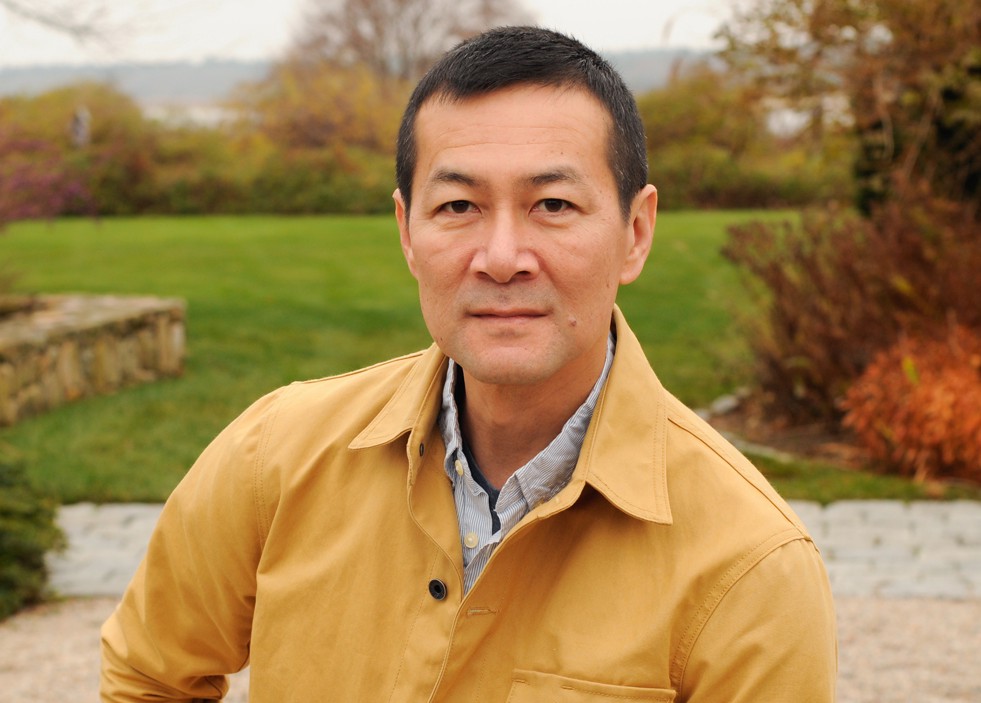
The lives and circumstances Lee outlines seem harrowingly dismal in the abstract, so the novel’s greatest triumph is the dignity he grants them. They’re believably average people with believably average relationships of the sort most novels would reasonably bypass. Manual laborers all, they’re being slowly killed by the source of their livelihoods, working backbreaking jobs because they have to and then immersing themselves in seemingly frivolous hobbies — music, poetry, supermarket tabloids — because they have nothing else to do. In the stark, at times stilted dialogue, Lee evokes how little friends and lovers ultimately know about each other, and the temptation to hold the past against one another. In efforts to assert his own manhood and leave something to his children, Jeanette’s ornery father seems at once selfish, pathetic, and distantly compassionate, diverting the narrative from self-pity. “Being depressed is a hobby only rich people can afford,” he tells Jeanette in typical aphorism. “You’re too old for ideals,” he later advises her.
With all the grasping for faith, love, and validation, there’s a lot here for such a quiet, earnest book, but Lee keeps it moving with a modest plot. A shadowy figure from the past blows into town, raising the stakes and threatening to upend Yadin and Jeanette’s paper empire. Characters are introduced in their diminished present, then given backstories via Ghost of Christmas Past-style flashbacks. While beautifully rendered, the revelations are grim. Among the hushed sadnesses of family businesses, inherited property, and marriages of convenience, even the most seemingly compatible people are irreconcilable in their damage and yearnings. Revisiting his past, Yadin recognizes the massive consequences of seemingly minor events, and how easily he could have spared himself a harsh adulthood. In his characters’ interactions, Lee presents the debilitating reality that all relationships are, in some sense, parasitic.
The book struggles in its portrayal of music. Like Nick Hornby’s Juliet, Naked and Rob Yardumian’s The Sound of Songs Across the Water, it relies on the poignancy of visceral ballads that don’t actually exist. Like Hornby and Yardumian, Lee transcribes the lyrics in their bare form, which is, of course, only part of the equation. Yadin seems oddly inarticulate for a supposedly great songwriter, especially one with so much material at his disposal.
Against the backdrop of blue-collar warfare Yadin’s friends find his devotion to music trite, and the urgency of a literary novel like Lonesome Lies Before Us may be similarly questioned in our current moment. But virtually of its themes — generational divide, working-class anxiety, the implications of local politics on our way of life — seem intensely vital if not outright prescient. The haunted residents of Rosarita Bay are united by their lack of control, and knowing better than to wish for escape hope merely for consolation. “Yadin had never been happy, and didn’t know if he ever could be,” the narrator proclaims in Lee’s frank eminence. “The best he had ever managed was not to be miserable.” Desperate for grace and solace on anyone’s terms, he finds it in one-sided conversations with his long-dead brother.
It’d be easy to label Lonesome Lies a tragedy, but I think that implies a fall from grace or a fatal error. If Lee’s passive, ghostly characters have a fatal error it’s that they can hardly be called actors at all, ambivalent participants in wavering deviations from the status quo. In wars of attrition, Lonesome Lies finds, there are no winners.
Firefox Is As Fast As Chrome Now, And No One Cares
Maybe the internet really is over

Firefox is as fast as Chrome now. Specifically, it’s finally doing the thing Chrome has already done for some time now that made it faster. I know you’ve been promised that Firefox is faster before, dashed among a lot of other internet hyperbole, and these promises did not come true. Firefox has instead sucked big time. Inevitably they had to get it right, though.
With that inevitability is a feeling, and that feeling may be: you don’t care. Great, Firefox is faster, but you’re tired! You have a lot of good reasons not to care, as switching a web browser is not some fly-by-night for-fun choice. Your web browser is officially a serious tool, and you’re going to need more than Firefox being exactly like the one you already have if you’re going to switch. The switching cost is too damn high.
Speaking of the web browser you already have, most likely, you are using Google Chrome. Eeeevvverrryone knows you’re using Google Chrome, especially Mozilla, the creators of Firefox, who have published their own report with humbling statistics about how everyone uses Chrome. If you want to see what’s inevitable, look at that website. It’s full of terrifying data points of inevitability turned into cool JavaScript chart things, showing us how Google knows a terrifying amount about us, Internet censorship is on the rise, and that only half the world uses the internet. (That last one is interesting, considering all this inevitability…)
I can’t help but wonder if this feeling of inevitability resonates with what the artists called “postinternet.” That is, maybe this is a sign that we have reached a point of growth in internet where its existence is no longer novel. Its effect on society is ubiquitous and lasting. Postinternet isn’t a very focused concept itself, but the time period inherent in its name is appealing, and you can kind of see it happening. The word INTERNET itself, once ringing with possibility, sure just feels like annoying screech of inevitability. (The people who don’t hear this screech have an idea for a website.)
For most of us, the web browser has gone from technology to tool, even though those two words have always meant the exactly same thing. It would make sense with life under postinternet that our choice of web browser wouldn’t really exist or—more likely under our current economic and social systems—be like choosing between brands of laundry detergent. Sure, they’ll distinctively “innovate” every once in a while with tasty dissolvable globules with the taste adults love, but really, it’s just soap.
But there’s always the possibility we’re calling it too early. After all, our choice of web browser used to be a principled one. It wasn’t about the speed. Firefox was the mainstream browser that we installed on our parents’ and grandparents’ computers over Thanksgiving. We sent them an email with some stuff to download before our flight in. We confirmed you can install it on practically anything — even that older computer — and that it wasn’t evil.
So, let’s do a quick exercise to see if we should still use Firefox. If the choice between the two is like choosing laundry detergent then hell, let’s call it: the browser wars are—no, the Internet is—totally over.
Let’s start by comparing features: Firefox is open source, but so is Chrome. Firefox has advanced privacy controls, but so does Chrome. Firefox has great development tools, but so does Chrome. Features just aren’t really relevant here. You can sync your bookmarks and run most plugins, though Firefox may have some trouble with things specifically built for Chrome, as they are less popular. This lack of popularity is what hurts Firefox the most. There are fewer plugins that work with Firefox, fewer cool web experiments, and fewer websites supporting Firefox the best etc. Unfortunately, the only fix is for Firefox to become more popular.
Both Firefox and Chrome are free. This too probably doesn’t matter. All it means is, you are the product, no matter which browser you choose. (What else is new? These days we’re lucky to get two or three choices.) The difference between the two, if anywhere, may be in their principles. Essentially, what kind of product do they see you as?
So what are Google’s principles? Great question! We know for a fact that Google is no longer not evil. This twisted concept is purposefully designed to repel us from caring. It’s like looking at a terrible shape your mind can’t find the corners for, its lines spinning off into Alphabets and Androids. Fear and confusion. The only way to save yourself is to look away, which may be exactly what they want. Google’s principles are driven by the shareholders’ (a.k.a. people with money) gaze.
Mozilla calls itself “the proudly non-profit champions of the Internet, helping to keep it healthy, open and accessible to all.” That sounds nice, and is presumably something they try and follow through on, which might actually make them a much more terrifying creature than Google, in a way. (Maybe a rat king?) Firefox is built by thousands of volunteers around the world (a.k.a. people with money and time), and functions as a meritocracy (a.k.a. videogame). If anything can be said about them, it’s that these volunteers like to argue about Firefox and Mozilla a lot. It’s kind of like Twitter, but with a purpose. It’s honestly just as terrible as Twitter too, but at least something is coming out of it. That’s part of why it took so long for Firefox to become faster. These volunteers drive the principles of the Mozilla organization as well.
So there is a difference between the two browsers. Firefox is basically like environmentally friendly organic soap, and it cleans just as well as Chrome now! With that in mind, your choice of web browser might be more significant than you realize. The internet isn’t over, it’s just beat us down really bad. Your choice of web browser is not inevitable. There’s still so much to do. I mean, Google and Mozilla — fuck them both, really! We’re just canaries in their twisted coal mine. Still, we have choices.
So I say why not switch to Firefox, if only as an act of psychological resilience (something we could all stand to practice right now)? The switching cost is actually not that high (yet). Chrome may not yet be inevitable, and using Firefox may align better with your principles. Also, there are still a lot of people without internet — a very non-postinternet sign. For them, the internet is much more inevitable, and might be way more so by the time it gets to them. If we all installed Firefox, things could be very different, should we ever reach that postinternet point. You can still help create the internet of tomorrow by installing a web browser, and it’s 2017.
Washed Out, "Hard To Say Goodbye"
Listen to this and not me.

Now that almost all music is easily available for your listening pleasure, and you can decide for yourself at the point of discovery whether you’d like it and want to hear more, how much help is it having someone else describe it to you? Just push play and skip all the stories! Here’s something from the new Washed Out, which is amazing, because it sounds like — actually, you’ll figure it out by clicking. Please enjoy.
New York City, June 18, 2017

★★ The night sweat became day sweat right there in bed, with no transition between. The sky was ugly and colorless. Hair failed to dry; the air conditioning made things clammy. A shower passed almost unnoticeably, leaving new wetness to steam up from the sidewalk. When the sun shone, things got even more unattractive, the miasma visible as it rose. Scraps of leaves and dirt and individual stray hairs floated down from a grate in the newly clear sunbeams underground at 110th Street. A curbside puddle was as greenish as a long-abandoned swimming pool.
Revisiting The Prophetic Verse Of Eve Merriam's 'The Nixon Poems'
It perfectly captures the anxiety of watching folly unfold daily
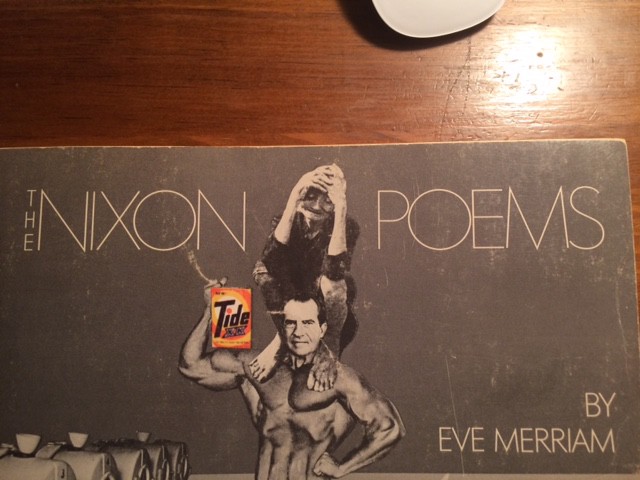
Four years before Watergate, Eve Merriam published The Nixon Poems, a collection dedicated “to the Constitution of the United States of America.” Merriam was not your typical satirist. She won the Yale Younger Poets Prize in 1946 for her collection, Family Circle, and primarily wrote verse for children — until her controversial 1969 collection The Inner City Mother Goose gained fame as one of the most banned books in the country.
The Nixon Poems is a surreal ride with a campy Pop art cover, complete with a blurb from Norman Mailer (“I didn’t think there could be anything new in anti-Nixon jokes, but Eve Merriam turns the subject into very funny and very painful little poems”) and illustrations from John Gerbino, a friend of Diane Arbus from Harper’s Bazaar. In a review upon its release, Kirkus praised the book, but wanted more: “We wish she had been still funnier — or more pointed, or stylish, or even malicious. Anything to ease the depression of seeing the national stalemate in verse. In thirty years or so this should be a very desirable number, with its quintessential mood and poppy graphics. We’ll have another look then.”
I had a look 47 years later, and agree that the book visually and stylistically captures a certain moment, but let me assure you: The Nixon Poems is frighteningly prophetic. Nixon–Trump comparisons are common, and will likely become even more so as the months go on, but I couldn’t believe the Trumpian visions that Merriam captures.
Here is the third poem in the book, “Program”:
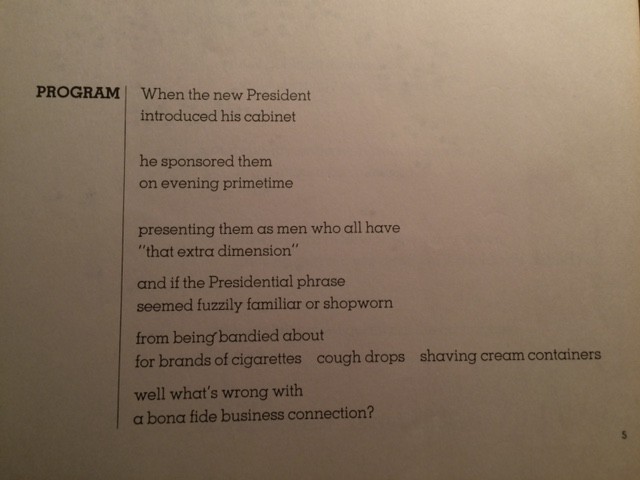
When the new President
introduced his cabinet
he sponsored them
on evening primetime
presenting them as men who all have
“that extra dimension”
and if the Presidential phrase
seemed fussily familiar or shopworn
from being bandied about
for brands of cigarettes cough drops shaving cream containers
well what’s wrong with
a bona fide business connection?

The Nixon Poems is one woman’s personal condemnation of an administration. The first line of the book is “I cannot pronounce his Presidential name.” The book is written as an act of disbelief; the collage art that surrounds the poems feels less flippant than an act of desperation. She’s exasperated and exhausted. She stumbles over his name “like getting up at night / and groping down the hall.” “Nowadays” perfectly captures the anxiety of 2017: “I wake in the morning / with a stone in my head // a stone in my heart // stones for legs // and I / walk.”
These poems might sound melodramatic. After all, the losing side is always angry and fairly bitter. But the Nixon of this book and the Trump of our contemporary reality show are the same. Nixon’s proclamation 3919, the National Day of Participation, is declared in advance of Apollo 11’s moon landing, but “suppose they don’t land / / well, we could always keep it as / a National Day of Mourning // There is a nixon style / everything is good for something.” You can imagine 45 doing that.
More prime Trumpian lines from “Metamorphosis”:
I lead the crusade against water pollution by a secret plan that
will be revealed at the proper time
I invite Billy Graham to bless the official White House
bowling alley
And I do not change
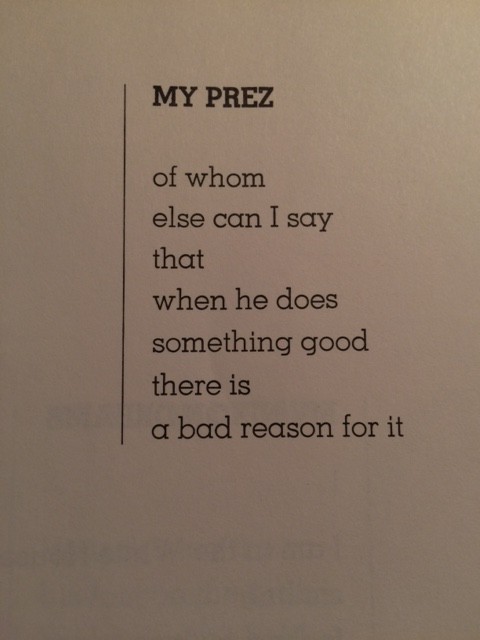
Merriam so perfectly captures the anxiety of watching folly unfold daily in “My Prez”:
of whom
else can I say
that
when he does
something good
there is
a bad reason for it
The Harvard Crimson took a dim view of The Nixon Poems, not because of Merriam’s verse, but because of the subject matter:
No great poetry can be written about Richard Nixon, for he is not important to men or to mankind in general. The attempt to enlarge him into a universal figure either for poetic glorification or vilification is doomed by his essential lack of distinction.
What should the poets do about Trump? Write about him. How should they write about him? However they want. Although The Nixon Poems somehow feels even more accurately recast as The Trump Poems, we need our own considerations and consternations. Let them be high-minded, or let them be absurd. Art has to work itself out. That process, especially with satire and humor, is often a mess. The critics will have us believe otherwise, but they are looking for patterns in the rubble. Our energies are wasted on critiquing the nuance of our contemporary political satire: it is like standing amidst the tracks and pondering their imperfect design, as the train barrels toward us.
Nick Ripatrazone has written for Rolling Stone, The Atlantic, Esquire, and The Paris Review. He’s on staff at The Millions.
Honestly, Fuck Your Wedding
Why you shouldn’t feel obligated to attend anyone’s wedding

Honestly, fuck your wedding. I know that’s rude, but it’s how I feel; it’s how we all feel. There is not a single thing worse than receiving a Save The Date in the mail. Not student loan payments; not coming to work after a three-day weekend; not even the everybody-just-throw-a-card-in method of paying at restaurants. Nothing. You done filled out your planner for the next few months with potential adventures only to find out the Mike & Andi from college have other plans for your Labor Day weekend. It’s like “Fuuuuuuuck, I haven’t even seen y’all in the past 4 years and I probably won’t for the next 40. Do I really have to come?”
The answer to question is no. You do not. It’s 2017 and the president will probably kill us all, so we really don’t have time to be what doing we don’t really want to do. I mean, sure, you might feel like an asshole at first, but once you hit that time on the clock where you absolutely know the wedding festivities are over, that feeling will subside and you’ll be high-fiving yourself for taking such honest initiative. Take a look at the facts:
1. We’re adults and too old to pretend that we want to do things we don’t want to.
Look at this clip of Jerry Seinfeld curving Kesha’s hug. Some people might call him an asshole. Know what I’m calling him? An honest, grown-ass man, that’s what. We’re too old to be pretending. You don’t have to pretend to like attending sporting events; you don’t have to pretend like you enjoy going out to the same-ass bars for the same-ass experience every weekend; and you don’t have to pretend like you want see anyone’s nuptials live and in color. If they really cared, they’d provide a live-stream like civilized human beings. Ya know, some shit you could roll up to. But they didn’t. Heathens.
2. Your presence is only truly required if you’re in the wedding party.
Think about it. The only people that the bride and groom reeeaalllyyy care about are standing right next to them on that stage. Or they’re sitting right there in the first row. Or they were at least inside the limo that delivered the wedding squad. But other than that, anyone else is just there for the theatrics. They invited you there for the applause, the awwwwwwwwwws, and to be background decor in all of the pictures/videos that the bride’s going to post on Instagram every other day for the next 8 months. They figured you didn’t have shit to do so you might as well come through with the clap-claps and joy-joys for the price of some dry-ass chicken and a couple captain-and-gingers from the open bar. Is that really worth sacrificing the time you were dedication to binge-watching Season 3 of “Unbreakable Kimmy Schmidt?” I think not.
3. You’ll barely even get to talk to the bride and groom.
Weddings ain’t about you. They’re about the people getting married and the parents that are finally free. I get that. But don’t invite me to a party if you don’t want to kick it. We act like we can’t skip a wedding because proper etiquette is to do the “Oh My God, I’m So Happy For You” in person. But then you get there and realize that so much is happening that you won’t even get the chance. The couple is so busy taking pictures and also trying to sneak out to go fuck that you’ll barely get to say more than a cross-room head-nod and drink-up gesture. So if your justification for forcing yourself to go is that you don’t want them to be angry, chances are they won’t even notice. And even if they do: see #1 above.
4. If you have to travel, it becomes more of an investment than event.
Got some homeboys who are debating if they should go to Dudio X’s wedding or not. One lives in LA, the other lives in OKC, and the wedding is in San Antonio. They’re are scared the Ol’ Boy will be pissed off they skip it. But if you look at it from a financial perspective, the costs far outweigh the benefit. A flight from LA to San Antonio on Southwest Airlines (Bags Fly Free): $400. Hotel/AirBnb for the minimum 2 days: $250. Uber/Lyft: $50. Food/Misc: $100. That’s $800 minimum for a 2-hour event that means literally nothing to either of them. Add on the fact that they haven’t seen the dude in the last 4 years and the entire experience becomes more of an investment than event. An investment with 0% return. In this economy?
5. They’re always on fucking holidays.
For people with jobs there’s absolutely nothing better than a 3-day weekend. We need them. We cherish them. It’s the one time that you can schedule some me-time without having to burn a PTO day. So when someone schedules their wedding on Memorial Day, or Labor Day, or any other day of the year that you’re getting paid to NOT be at work, it feels like the ultimate fuck you. It’s like hey, I know you might’ve been planning to hit Vegas to sniff coke out a stripper’s butt crack, but we actually need you to come to Beaumont, TX to see us say 2 words and kiss. No more, I say. No more will we allow the holy matrimony of others getting in the way of us hitting Drai’s Beach Club and Stunting For The Gram. I’ll text you my congratulations from the roulette table.
6. Is your time worth the risk of divorce?
Look man, this is dark as hell, but facts are facts. The stats and probability of divorce are already against them. I already know 6 couples who have gotten divorces within the first 3 years, and I’m sure there will be more to follow. No one wants to hear that, the game of marriage really ain’t set up for many people to win. I mean, dog, if Brad and Angelina couldn’t make it, then what are the chances of Karen and Daniel surviving the winter? Are your friends better than Carmelo and La La? Can they stand the rain? If your honest answer is probably not then you might want to allocate that supposed-to-be-at-the-wedding time differently. There’s nothing worse than the regret of wasted time. Except receiving Save The Dates in the mail, of course.
Marriage is the Hefty Bag You'll Use to Bury Your Heart in the Woods
And other answers to questions you didn’t ask
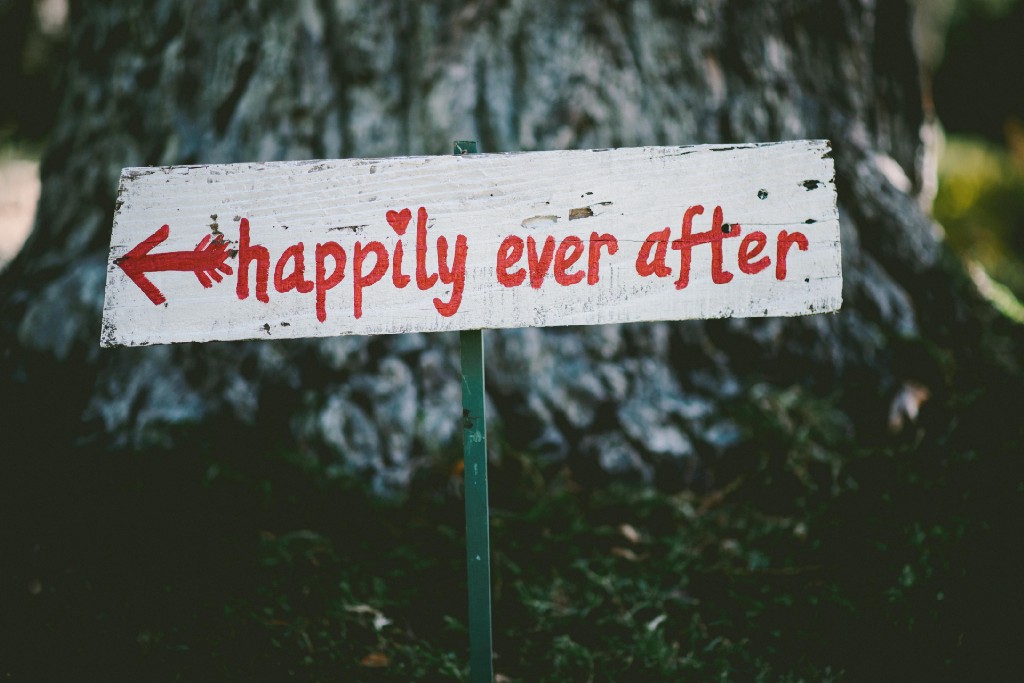
“Wedding season has begun. How am I going to get through it?” — Single Sal
Marriage is a Medieval Tradition in which we give away daughters and get cows back. It’s kind of like NBA Draft Day. I’ll give you the #1 pick and you give me #1 picks in 2020, 2022 and 2025. Or whatever. You probably won’t even want those picks in the 20s. It’s an antiquated system meant to squash everyone’s individual sexuality into something capitalists can use against you. Without marriage everything would be cheaper. One Bedroom apartments wouldn’t be $2000 a month, that’s for sure.
If everyone just picked up someone in a bar and got laid occasionally instead of hooking up semi-permanently with people they will wildly outgrow, would the world be a better place? There would be a lot more seats on the L Train, that’s for sure. Sure, fall in love and get married and have kids. That’s just what the 1% wants! So they can control you your whole life! They’ll make you dance like a monkey for health care and keep schools bad so your kids can polish their silverware for a living.
But weddings are the most fraught social events of the summer. Getting dragged to some gazebo with pelicans circling while some family friend reads a poem by Rumi over the happy couple who then promise each other to not act like most human beings. On the plus side, there’s cake. You gotta wait forever, but there’s cake. It might be vegan free-range seaweed cake, but it’s still cake. Single people and weddings go together like single people and funerals. It’s an unwelcome reminder that you will die alone and no one will give a fuck.
Weddings are long and boring. Getting invited to a wedding, a supposedly-joy-filled event for the participants, is a clusterfuck of responsibilities. Getting tuxes, flowers, lube, booze, cocaine, strippers, dildos. And don’t forget shovels, tarps, lye. It’s the hidden costs that get you the worst. Most of my pals are on their 2nd marriages. That means I’ve already worn taffeta for you! How dare you make me buy you another gravy boat! Your other gravy boat is in storage.
The key to getting through a wedding is just to get as drunk as possible and possibly laid. You’ll get in trouble for doing either one of these things. But it will be worth it. There is usually a cool DJ who will play all the songs from the ’80s. And every open bar will only be open for a little while. So you’re going to need your own stash of booze. And possibly ’80s songs.
People may want you to give a funny and sweet speech at a wedding. If you pretend to cry at the very beginning of this speech, it will go way better. People who get all choked up about love and the beauty of marriages, you will get through this with flying colors. Anyone who rolls their eyes at the mere mention of enduring love, this is going to be a piñata full of things that suck for you. People can smell your suspicion on you. It’s like those blond kids who point at each other and scream “One of us! One of us!”
If you fundamentally refuse to play along with the zero sum game of Love and Marriage with the rest of “Decent Society” you will be smoked out as a mutant and disinvited to all weddings down the road. Not a bad outcome! Divorced friends are way more fun, anyway. They have zero fucks to give and can really be there for you when you need them. They won’t have to go to “Date Night” at Applebee’s. If one date per week could save the American Marriage it would be “Date the Nanny/Gardener Night.” Monogamy is the lie we keep on telling ourselves, because it just keeps getting funnier.
Show up drunk and just kind of blend in. If you can leave early, go for it. You can always tell them you had a bad clam somewhere, no one will follow that up in search of more info. Some day when we’ve found the cure for harmful emotions like love and compassion we will all live happier, alone and well-fucked by some kind of thing you plug into your computer or phone. Let’s stop pretending that humanity deserves to last forever. It’s not you, it’s everyone. Everything is terrible and we all keep making the same mistakes expecting different results. You know what they call that? Life.
Jim Behrle lives in Jersey City, NJ and works in a bookstore.
The/Das, "Top Vibes"
It’s happening again.
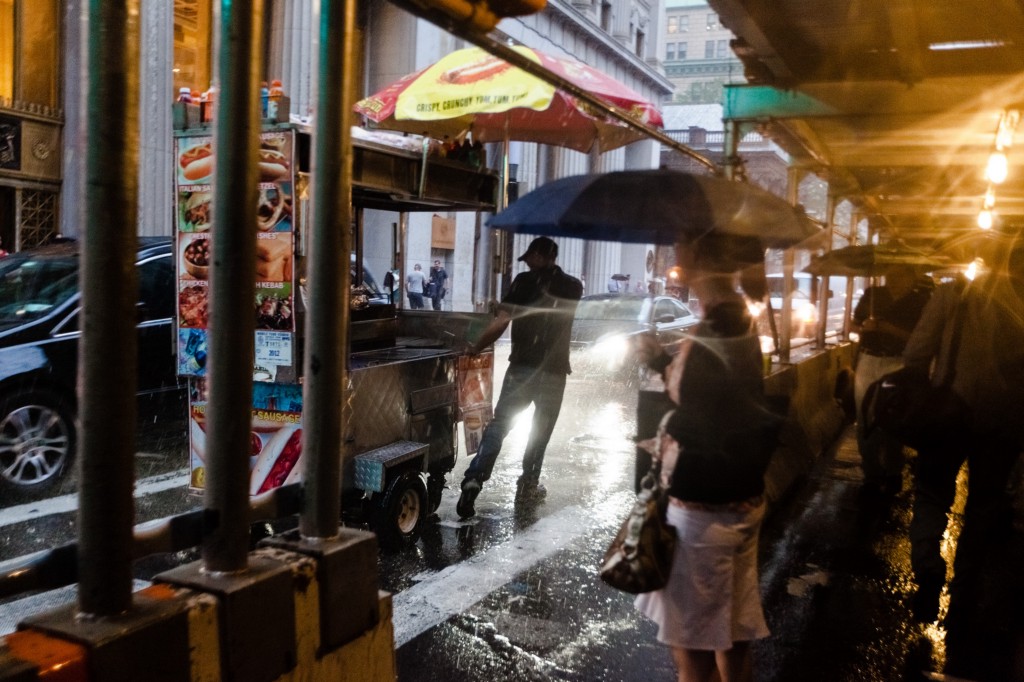
Weren’t we just here? Wasn’t it moments ago that we were waking up to a new week, full of dread and barely able to drag ourselves to the starting line? Didn’t we just complain about how exhausted we were and wonder how much more we could take? I guess the good news is I can copy and paste this exact block of text over and over again until it finally all comes down, because we live in a world where it’s always like this now. Here’s some music. Enjoy.
New York City, June 15, 2017

★★★★ Pink scraps of water balloon lay on the schoolyard asphalt. Enough clouds came to hold back the sun during the wait. Buying hot coffee instead of iced now felt like the opportunistic choice. The breeze was cool and clean, moving smoothly over bare ankles; the sun was only warm and nothing more. Walking around, it was hard to remember to do the errands that were supposed to have provided the excuse for having gone outside. The light stayed and stayed, past dinner and a few rounds of beers. The air blowing around the back of the taxi, on the way through the near midnight darkness of the Park, was a little chilly. Saturn shone down yellow, from its place fully opposite the sun.

